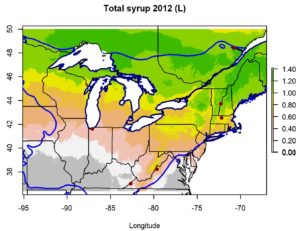On December 15th, 2017, ACERnet presented a special track of talks and discussions at the Forest Ecosystem and Monitoring Cooperative Conference in Burlington, Vermont on ‘What are the impacts of climate  change on maple syrup production and can we manage for them?’ ACERnet researcher Josh Rapp shared results from ACERnet’s field data collections on sap flow and sap sugar content in a talk entitled ‘Finding the sweet spot: climate optimum for maple syrup production‘. Selena Ahmed and David Lutz shared results on sap chemistry and ACERnet’s surveys of maple producers in a talk entitled ‘Climate Effects on Maple Phytochemistry and Producer Perceptions and Responses’. Autumn Brunelle presented a talk entitled ‘What Sap with That?: A look at how Native Americans are Adapting to Climate Change and Maple Sap Production’ which shared insights from her interviews with Native American maple tappers. Bonnie Ekdahl and Alex Bryan finished out the session with ‘ Ziizabokdoke: A cultural tradition of sugar making for one Midwestern tribe and seven generations of change’, in which Bonnie, a a sugarer from the Saginaw Chippewa Indian Tribe, described her approach to sugaring, while Alex used climate models and data that Bonnie collected to explore seven generations of change in tapping.
change on maple syrup production and can we manage for them?’ ACERnet researcher Josh Rapp shared results from ACERnet’s field data collections on sap flow and sap sugar content in a talk entitled ‘Finding the sweet spot: climate optimum for maple syrup production‘. Selena Ahmed and David Lutz shared results on sap chemistry and ACERnet’s surveys of maple producers in a talk entitled ‘Climate Effects on Maple Phytochemistry and Producer Perceptions and Responses’. Autumn Brunelle presented a talk entitled ‘What Sap with That?: A look at how Native Americans are Adapting to Climate Change and Maple Sap Production’ which shared insights from her interviews with Native American maple tappers. Bonnie Ekdahl and Alex Bryan finished out the session with ‘ Ziizabokdoke: A cultural tradition of sugar making for one Midwestern tribe and seven generations of change’, in which Bonnie, a a sugarer from the Saginaw Chippewa Indian Tribe, described her approach to sugaring, while Alex used climate models and data that Bonnie collected to explore seven generations of change in tapping.
After the talks, maple tappers, land managers, and researchers met in working groups to discuss the threats that climate change posses to the maple sugaring industry and adaptation strategies. Workshop participants identified climate variability and earlier tapping seasons due to warmer winters and springs as the many threats and agreeded that more research is needed on climate impacts and adaptations.
There were several maple-themed posters at the closing event of the conference, including those by ACERnet researchers Josh Rapp and Ryan Huish.